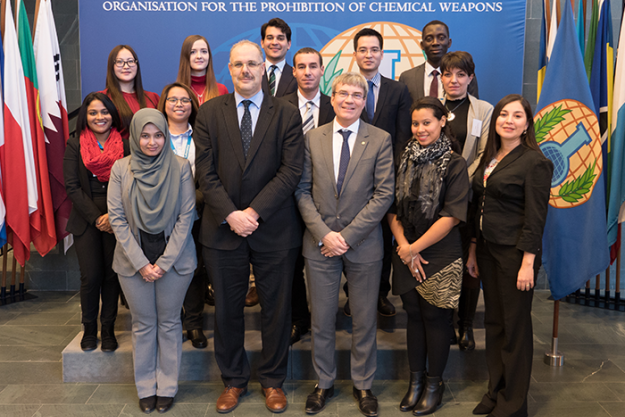
Participants at a OPCW capacity-building initiative for analytical chemists who work with customs services
THE HAGUE, Netherlands –21 December 2017– The Organisation for the Prohibition of Chemical Weapons (OPCW) embarked on a fresh capacity-building initiative for analytical chemists who work with customs services, as they completed the inaugural training held at the OPCW Laboratory in Rijswijk from 11-15 December.
The Director of the OPCW International Cooperation and Assistance Division, Mr Hamza Khelif, explained in his opening remarks that, “customs services worldwide are expanding their role in addressing the security threats. Customs’ laboratories support the frontline work of customs officers and contribute to promoting chemical security through the analyses of substances that may be used as chemical weapons”.
Analytical chemists from laboratories supporting or planning to support customs services gained skills and knowledge to analyse the chemicals relevant to the Chemical Weapons Convention.
They learned about the role of customs services’ labs in supporting the National Authorities for border controls.
The course also covered the provisions of the Chemical Weapons Convention and OPCW’s work to implement the treaty.
Participants further visited the Dutch Customs Laboratory and the Netherlands Forensic Institute to explore best practices for ensuring the chain of custody for evidence, as well as procedures for chemical analyses related to border controls.
Professionals from ten OPCW Member States took part in the training, including Algeria, Belarus, El Salvador, Ghana, Mauritius, Mongolia, Nicaragua, Philippines, Serbia and Vietnam.
Background
As the implementing body for the Chemical Weapons Convention, the OPCW oversees the global endeavour to permanently and verifiably eliminate chemical weapons. Since the Convention’s entry into force in 1997 – and with its 192 States Parties – it is the most successful disarmament treaty eliminating an entire class of weapons of mass destruction.
Over ninety-six per cent of all chemical weapon stockpiles declared by possessor States have been destroyed under OPCW verification. For its extensive efforts in eliminating chemical weapons, the OPCW received the 2013 Nobel Prize for Peace.
